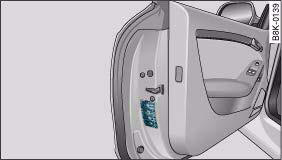Tyre service life
Correct inflation pressures and sensible driving habits will increase the service life of your tyres.

Fig. 219 Open driver's door (LHD vehicle) with sticker listing tyre inflation
pressures
Ц Check the tyre pressures at least once a month.
Ц The tyre pressures should only be checked when the
tyres are cold. The slightly raised pressures of warm tyres
must not be reduced.
Ц The pressures must be altered to suit major changes in
the load being carried.
Ц Avoid fast cornering and hard acceleration.
Ц Inspect the tyres for irregular wear from time to time.
Tyre pressure and vehicle loading
The tyre pressure must be adjusted according to the load the vehicle is carrying. We recommend adhering to the tyre pressure specifications for a maximum load. The tyre inflation pressures are listed on a sticker on the end face of the driver's door ⇒ fig. 219.
However, if you prefer an extra-smooth ride and the vehicle is not fully loaded, you can select the tyre pressure for a normal load (no more than three people travelling in the vehicle). However, should you wish to drive with a full load you must increase the tyre pressure to the specified maximum.
Under-inflation or over-inflation will reduce the life of the tyres considerably and also impair the car's handling. Correct inflation pressures are very important, especially at high speeds. The pressures should therefore be checked at least once a month and before starting a journey.
Do not forget the spare wheel* when checking the tyre pressures.
Keep the spare tyre inflated to the highest pressure required for the road wheels.
Driving habits
Fast cornering, heavy acceleration and hard braking (squealing tyres) all increase tyre wear.
Wheel balancing
The wheels on new vehicles are balanced. However, various factors encountered in normal driving can cause them to become unbalanced, which results in steering vibration.
Unbalanced wheels should be rebalanced, as they otherwise cause excessive wear on steering, suspension and tyres. A wheel must also be rebalanced when a new tyre is fitted or if a tyre is repaired.
Incorrect wheel alignment
Incorrect wheel alignment causes excessive tyre wear, impairing the safety of the vehicle. If you notice excessive tyre wear, contact your Audi dealer.
 WARNING
WARNING
Х Always adapt the tyre pressure accordingly when the vehicle
load changes.
Х Under-inflated tyres flex more and can overheat at continuous
high speeds. This can cause tread separation and tyre blow-out,
which could result in an accident.
For the sake of the environment
Under-inflated tyres will increase the fuel consumption.
